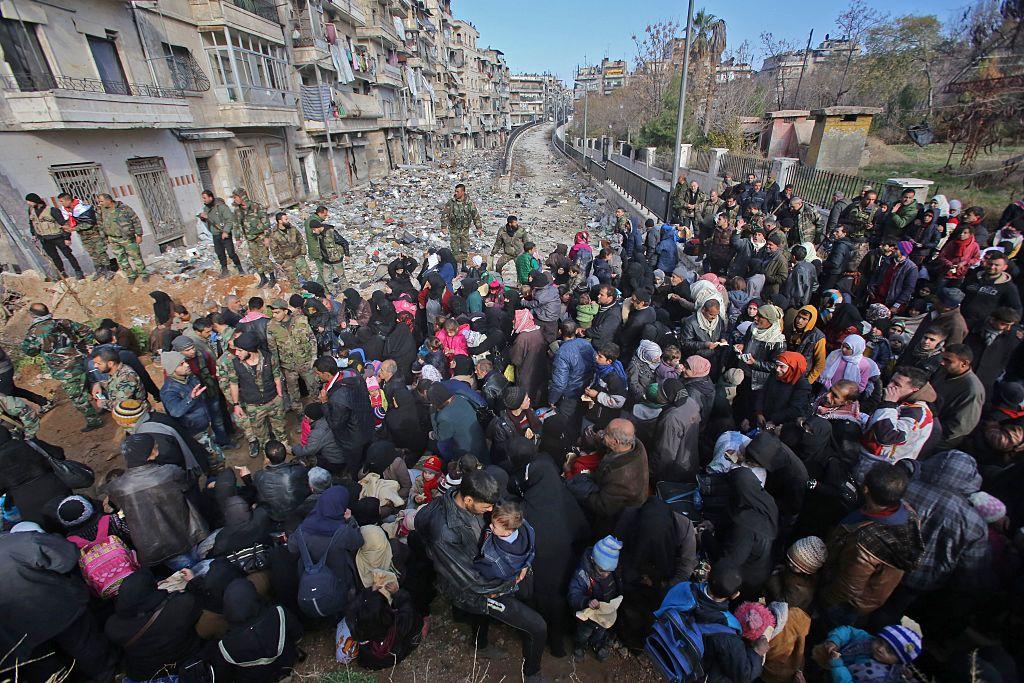More than 150,000 people 'condemned to death’ at hands of Assad regime, city's council head says
Rebels and international community renew pleas for Russia to exert pressure on the Syrian government for a truce as Moscow claims the Syrian army have stopped military operations in eastern Aleppo

Your support helps us to tell the story
From reproductive rights to climate change to Big Tech, The Independent is on the ground when the story is developing. Whether it's investigating the financials of Elon Musk's pro-Trump PAC or producing our latest documentary, 'The A Word', which shines a light on the American women fighting for reproductive rights, we know how important it is to parse out the facts from the messaging.
At such a critical moment in US history, we need reporters on the ground. Your donation allows us to keep sending journalists to speak to both sides of the story.
The Independent is trusted by Americans across the entire political spectrum. And unlike many other quality news outlets, we choose not to lock Americans out of our reporting and analysis with paywalls. We believe quality journalism should be available to everyone, paid for by those who can afford it.
Your support makes all the difference.More than 800 people have been killed and up to 3,500 injured in east Aleppo as a result of the Syrian government’s final push to take the city, the president of the city’s local council has said.
Those who have not fled to government or Kurdish-controlled areas effectively wait a death sentence, Brita Haji Hassan said in Geneva on Thursday, where he is meeting with the UN’s special envoy to Syria, Staffan de Mistura.
“Today 150,000 people are threatened with extermination. We are calling for a halt to the bombing and guarantees of safe passage of all,” he said, citing figures from the local civil defence rescue service.
Rescue workers and activists have been struggling to document casualties because of the intensity of government bombings, which were renewed with a vengence two weeks ago.
Around 250,000 people were thought to be trapped within east Aleppo’s siege barricades, either unwilling or unable to leave and facing starvation, when Syrian President Bashar al-Assad’s government declared that the offensive on the city would be completed before the change of administration in the US.
Since then, around 80,000 people are thought to have fled to government and Kurdish-controlled parts of the city, and regime forces have clawed back three quarters of the besieged rebel enclave.
On Wednesday rebels called for a five day humanitarian truce to allow for UN-monitored medical evacuations from the city, saying Aleppo’s future could be decided in the pause, but without offering any possibility of a surrender.
Representatives from Russia, Turkey and the US all said that their foreign ministries had been working towards a ceasefire deal, but the Syrian regime has signalled it will not accept anything other than total victory now that control of the city – contested since 2012 – is within reach.
“Aleppo will completely change the course of the battle in all of Syria,” Syrian state television quoted Syrian President Bashar al-Assad as saying on Wednesday night, calling Aleppo the “terrorists’ last hope”.
On Thursday, Russian Foreign Minister Sergei Lavrov said that the Syrian army had stopped active military operations in east Aleppo because a large effort to remove civilians from the city was under way, RIA news agency reported.
Mr Lavrov added that it had been agreed that Russian and US military experts would meet in Geneva on Saturday to discuss the situation in the city.
Aleppo – once considered the “Jewel of Syria” – has seen some of the war’s heaviest fighting, and is now the last urban stronghold of the Sunni rebel alliance, partly backed by the US, Turkey and the Gulf states.
Mr Assad’s fortunes in the war have been greatly helped by military intervention from foreign Shia militias from Iran, Lebanon and Palestine, as well as Russian firepower from September 2015.
Also on Thursday, the head of the UK’s intelligence services has warned that Russia’s actions in Syria are a direct security threat to the UK, creating the conditions for a whole new generation of terrorists.
“In Aleppo, Russia and the Syrian regime seek to make a desert and call it peace”, MI6 director-general Alex Younger said in his first public speech at the agency’s London headquarters. “The human tragedy is heartbreaking.”
Elsewhere in Syria, with the regime’s focus on the north of the country, Isis seized the opportunity to retake territory near the ancient city of Palmyra. The group previously held the Roman town for 10 months, destroying priceless ruins and artefacts, before they were driven out by the Syrian army in March.
Isis launched a two-pronged attack on government checkpoints and a nearby oil field, the UK-based monitor the Syrian Observatory for Human Rights said, in some places advancing as close as five miles (eight kilometres) away from the town.
Opposition group the Palmyra Coordination Committee also said that Isis had advanced from the south and north, capturing grain silos and a number of small villages.
Isis’ news agency Amaq posted a statement saying that the whole area of Huwaysis between Aleppo province and Palmyra had been recaptured, posting a video of four captive Syrian army soldiers.
Attacking unsuspecting fronts is a common Isis tactic. The jihadis tend to withdraw whenever a counterattack is launched, but usually manage to pick up supplies and ammunition in the process.
The almost-six-year-long civil war in Syria has killed more than 400,000 people and displaced more than half the population from their homes, the UN says.
Although both Isis and the Free Syrian Army – Mr Assad's main foes – have suffered several military setbacks in recent months, analysts say the complex war is far from over.
Join our commenting forum
Join thought-provoking conversations, follow other Independent readers and see their replies
Comments